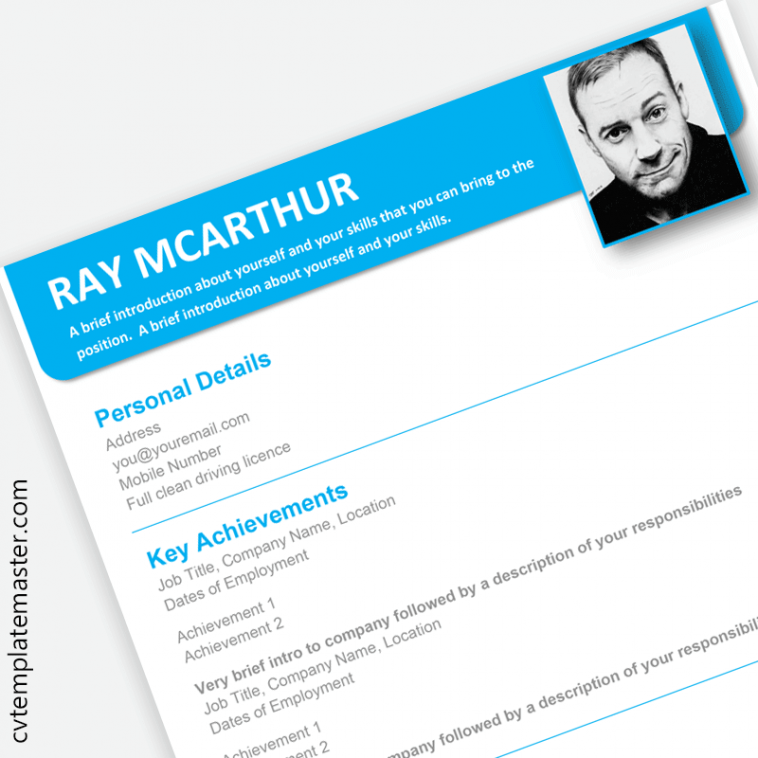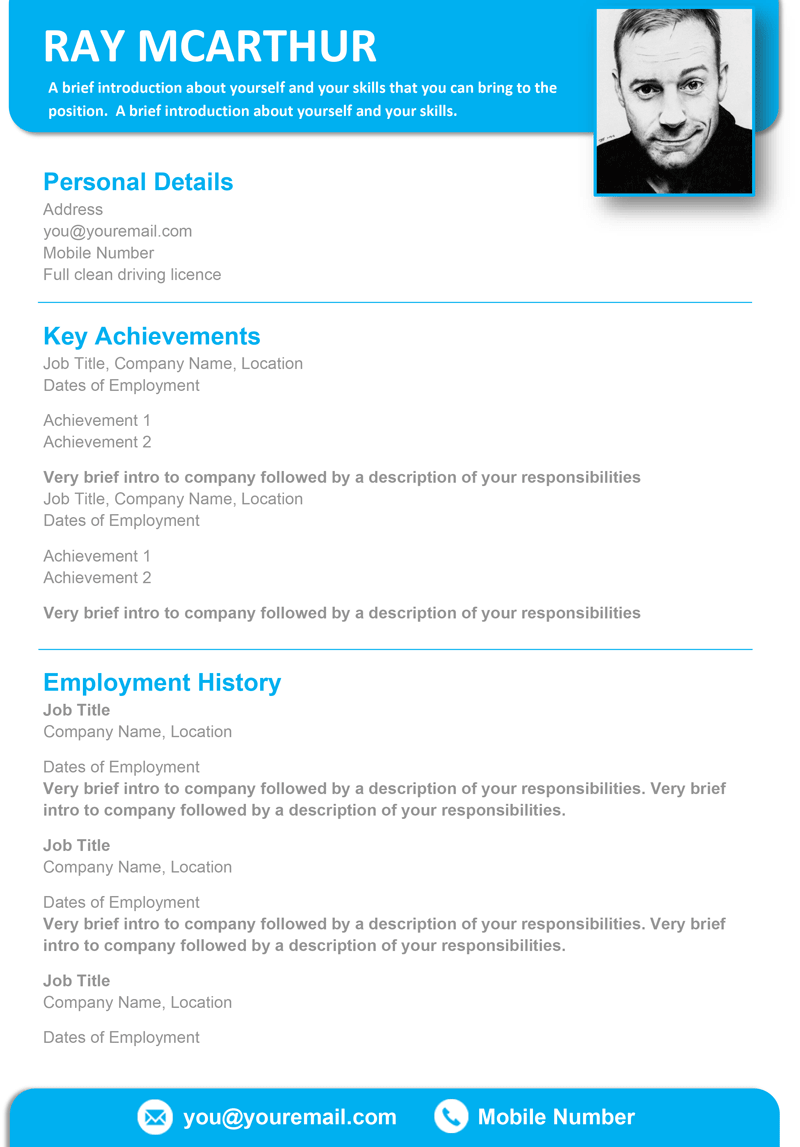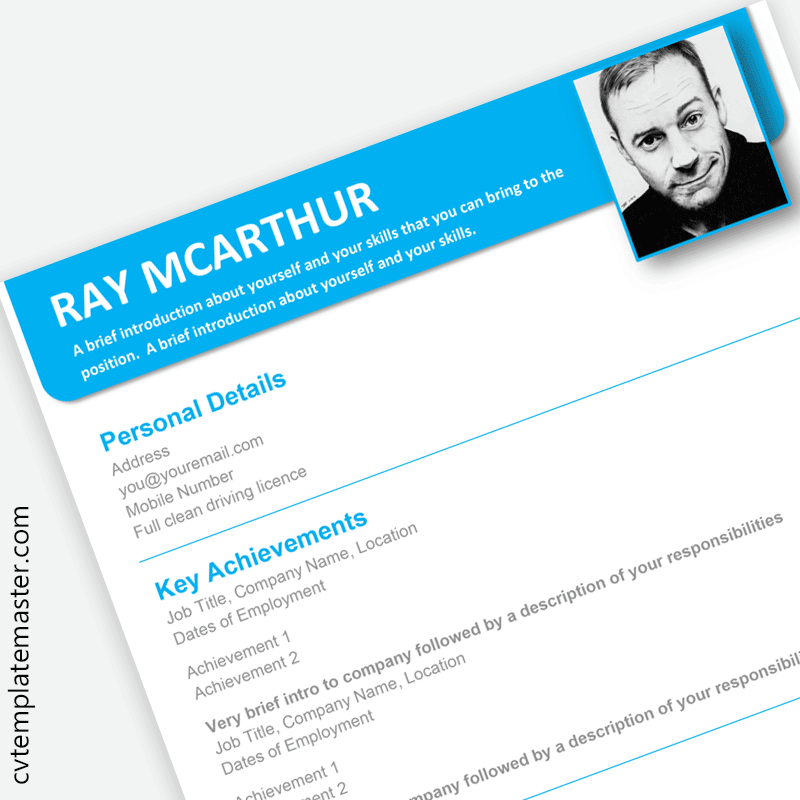Template details:

Here’s a full preview of this creative CV template:

3 things to avoid when writing your CV
When it comes to writing a CV it’s equally as important to know what not to put in than it is what to include. Every single word you write on your CV could add value, but it could also hinder your chances of success if you aren’t sure what to include.
Here’s our quick guide of what to avoid when writing your CV…
Spelling mistakes and grammatical errors
This is one of the most common mistakes to make in a CV, and probably the most annoying from the readers perspective. You’d be surprised how often mistakes still appear in a CV, and when the hiring manager has so many to read and choose from, if yours has even just one small error it could mean your CV is dumped straight onto the ‘no’ pile.
Don’t just rely on your word processing document to check the spelling for you, as it can often be incorrect for a number of reasons. For example, you might have the wrong language setup in your word processing settings. English and US words are often spelt differently, and it will look very strange if your CV is using the wrong language.
Grammatical errors are also sometimes hard for the word document to find, and I often find myself disagreeing when it suggests to change words like ‘there’ into ‘their’, and another common one is ‘its’ into ‘it’s’.
Sure, using the spell checking tool is the first place to start, but you must follow that up with the naked eye – and check it numerous times, not just once. Finally, pass it along to at least two other people to check further, and ideally they also may be able to help you with the content too for an added bonus.
Writing a generic CV
Don’t be lazy when it comes to writing your CV and fall into the trap of making it too generic. Your CV has to be written and tailored to the role/industry you are applying for. If you are applying for a few different positions, then you should still create different CV’s that are custom written for each application.
Applying with a generic CV will not help an employer identify you as the right person for the job, and it will just make it harder for them to see through the content to find out what you have to offer. On the other hand, a CV which is perfectly tailored to the role and industry will stand out from the other applicants and give you the very best opportunity of getting an interview.
Within just a few seconds the reader wants to see if you have what it takes to join their company – depending on what qualities the employer is looking for; it could be the right skills, qualifications, experience, knowledge etc. If you hide this relevant and vital information amongst lengthy nonsensical statements and paragraphs, you are just making it hard work for no reason. The hiring manager shouldn’t have to do all the hard work, and with so many other CVs to look through it could mean an instant rejection.
Keep your CV focused on the role and highlight all of the relevant skills, qualifications and experience that the company has either requested or you know they will want and expect to see from a successful candidate.
Using clichés
‘I have great communication skills…’
Although this isn’t necessarily a bad thing to include in your CV, using cliché words and statements are not a great idea if you are unable to back them up with achievements and results.
The recruitment manager is not able to trust that you have great communication skills just because you said so – and why should they when they have never even met you?! So the best way to help them decide is to highlight previous skills and tasks that you’ve performed which would clearly demonstrate your communication skills.
However, highlighting previous roles and situations where your communication skills were put to the test isn’t still enough, and achievements and results are what’s needed here. Merely stating you were a waitress isn’t enough to show off your communication skills. You might have been a bad waitress for all they know, however if you were the highest tip earner on a regular basis, then this is what the recruiter wants to know.
By presenting the reader with this information you’ve instantly built up a positive picture in their mind of how you conduct yourself. If you were consistently earning lots of tips then you were clearly a good communicator!
Tip – only provide examples of your performance which clearly relates to the new role you’re applying for. If you are unable to do this but still have some outstanding achievements you want to share – then that’s OK. However, you should be striving to only highlight your performance which is relevant to the employer. Focus upon which soft skills the employer is looking for – communication, team working, problem solving, and so on.
